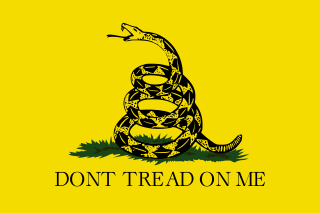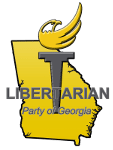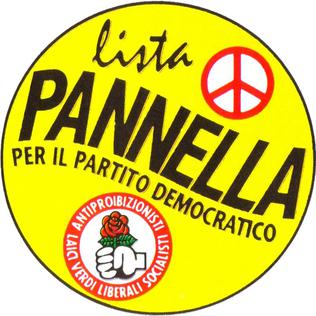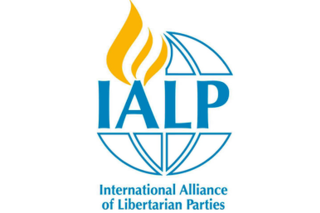Lists of libertarian topics include:
Lists of libertarian topics include:
Libertarian socialism, also known by various other names, is a left-wing, anti-authoritarian, anti-statist and libertarian political philosophy within the socialist movement which rejects the state's control of the economy under state socialism. Overlapping with anarchism and libertarianism, libertarian socialists criticize wage slavery relationships within the workplace, emphasizing workers' self-management and decentralized structures of political organization. As a broad socialist tradition and movement, libertarian socialism includes anarchist, Marxist, and anarchist- or Marxist-inspired thought and other left-libertarian tendencies.

The Libertarian Party (LP) is a political party in the United States that promotes civil liberties, non-interventionism, laissez-faire capitalism, and limiting the size and scope of government. The party was conceived in August 1971 at meetings in the home of David F. Nolan in Westminster, Colorado, and was officially formed on December 11, 1971, in Colorado Springs, Colorado. The organizers of the party drew inspiration from the works and ideas of the prominent Austrian school economist, Murray Rothbard. The founding of the party was prompted in part due to concerns about the Nixon administration, the Vietnam War, conscription, and the introduction of fiat money.
These are articles that list people of a particular religious or political belief or other worldview.
The Libertarian Party of Canada is a federal political party in Canada founded in 1973. The party subscribes to classical liberal tenets, and its mission is to reduce the size, scope, and cost of government. Party policies include ending drug prohibition, ending government censorship, lowering taxes, protecting gun rights, and non-interventionism.

The Ontario Libertarian Party is a minor libertarian party in the Canadian province of Ontario. Founded in 1975 by Bruce Evoy and Vince Miller, the party was inspired by the 1972 formation of the United States Libertarian Party. The party is guided by a charter of principles, and its own Ontario charter of rights and freedoms.
Civil libertarianism is a strain of political thought that supports civil liberties, or which emphasizes the supremacy of individual rights and personal freedoms over and against any kind of authority.

Agorism is a social philosophy that advocates creating a society in which all relations between people are voluntary exchanges by means of counter-economics, engaging with aspects of nonviolent revolution. It was first proposed by American libertarian philosopher Samuel Edward Konkin III (1947–2004) at two conferences, CounterCon I in October 1974 and CounterCon II in May 1975.
Left-libertarianism, also known as egalitarian libertarianism, left-wing libertarianism, or social libertarianism, is a political philosophy and type of libertarianism that stresses both individual freedom and social equality. Left-libertarianism represents several related yet distinct approaches to political and social theory. Its classical usage refers to anti-authoritarian varieties of left-wing politics such as anarchism, especially social anarchism, whose adherents call it libertarianism, communalism, and libertarian Marxism, collectively termed libertarian socialism. A portion of the left wing of the green movement, including adherents of Murray Bookchin's social ecology, are also generally considered left-libertarian.
Libertarianism is a political philosophy that upholds liberty as a core value. Libertarians seek to maximize autonomy and political freedom, and minimize the state's encroachment on and violations of individual liberties; emphasizing the rule of law, pluralism, cosmopolitanism, cooperation, civil and political rights, bodily autonomy, free association, free trade, freedom of expression, freedom of choice, freedom of movement, individualism and voluntary association. Libertarians are often skeptical of or opposed to authority, state power, warfare, militarism and nationalism, but some libertarians diverge on the scope of their opposition to existing economic and political systems. Various schools of Libertarian thought offer a range of views regarding the legitimate functions of state and private power, often calling for the restriction or dissolution of coercive social institutions. Different categorizations have been used to distinguish various forms of Libertarianism. Scholars distinguish libertarian views on the nature of property and capital, usually along left–right or socialist–capitalist lines. Libertarians of various schools were influenced by liberal ideas.
In the United States, libertarianism is a political philosophy promoting individual liberty. According to common meanings of conservatism and liberalism in the United States, libertarianism has been described as conservative on economic issues and liberal on personal freedom, often associated with a foreign policy of non-interventionism. Broadly, there are four principal traditions within libertarianism, namely the libertarianism that developed in the mid-20th century out of the revival tradition of classical liberalism in the United States after liberalism associated with the New Deal; the libertarianism developed in the 1950s by anarcho-capitalist author Murray Rothbard, who based it on the anti-New Deal Old Right and 19th-century libertarianism and American individualist anarchists such as Benjamin Tucker and Lysander Spooner while rejecting the labor theory of value in favor of Austrian School economics and the subjective theory of value; the libertarianism developed in the 1970s by Robert Nozick and founded in American and European classical liberal traditions; and the libertarianism associated with the Libertarian Party, which was founded in 1971, including politicians such as David Nolan and Ron Paul.
Libertarian Party may refer to:

Right-libertarianism, also known as libertarian capitalism or right-wing libertarianism, is a libertarian political philosophy that supports capitalist property rights and defends market distribution of natural resources and private property. The term right-libertarianism is used to distinguish this class of views on the nature of property and capital from left-libertarianism, a type of libertarianism that combines self-ownership with an egalitarian approach to natural resources. In contrast to socialist libertarianism, right-libertarianism supports free-market capitalism. Like most forms of libertarianism, it supports civil liberties, especially natural law, negative rights, the non-aggression principle, and a major reversal of the modern welfare state.

Founded in 1971, The Libertarian Party of Georgia is a state affiliate of the United States Libertarian Party.

The Pannella List is a liberal and libertarian association, which was also the electoral list of the Italian Radicals between 1992 and 1999, when it was replaced by the Bonino List.
The Libertarian Party of Ohio (LPO) is the Ohio affiliate of the Libertarian Party. It is the fourth largest state affiliate of the Libertarian Party nationally and the third largest political party in Ohio.
The following outline is provided as an overview of and topical guide to libertarianism, a political philosophy that upholds liberty as its principal objective. As a result, libertarians seek to maximize autonomy and freedom of choice, emphasizing political freedom, voluntary association and the primacy of individual judgment.
Libertarianism is a political philosophy and movement that upholds liberty as the highest political end. Libertarianism may also refer to:

The term classless society refers to a society in which no one is born into a social class. Distinctions of wealth, income, education, culture, or social network might arise and would only be determined by individual experience and achievement in such a society. Thus, the concept posits not the absence of a social hierarchy but the uninheritability of class status. Helen Codere defines social class as a segment of the community, the members of which show a common social position in a hierarchical ranking. Codere suggest that a true class-organized society is one in which the hierarchy of prestige and social status is divisible into groups. Each group with its own social, economic, attitudinal and cultural characteristics, and each having differential degrees of power in community decision.

The International Alliance of Libertarian Parties (IALP) is an alliance of libertarian political parties around the world. Its mission is to promote such libertarian politics internationally.